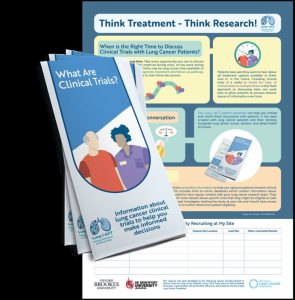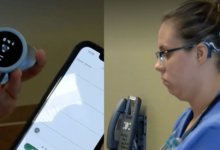Nurse-led pilot aims to improve patient access to clinical trials

A tool is being piloted across hospital sites in England and Scotland to support nurses to have conversations with lung cancer patients about clinical trial opportunities.
The resource, which includes a poster and a leaflet, has been rolled out as part of a nurse-led study being undertaken by researchers at Oxford Brookes University.
“There’s never a right or wrong time to discuss trials”
Catherine Henshall
The goal of the Lung I-ACT study is to break down the barriers that lung cancer patients face when accessing clinical trials.
Clinical trials offer lung cancer patients the opportunity to access treatments that are innovative and would otherwise be unavailable to them.
Despite this, statistics have shown that participation in lung cancer clinical trials has decreased in recent years.
As such, the Roy Castle Lung Cancer Foundation has provided £147,000 in funding for the two-year piece of research.
Professor Catherine Henshall, professor of nursing at Oxford Brookes University and associate director of nursing and midwifery at the National Institute for Health and Care Research, is chief investigator on the project.
She told Nursing Times that the study was about “equipping nurses with the confidence and the tools to be able to have those conversations” about lung cancer clinical trials.
The tool is made up into two parts: a poster for nurses and a leaflet for patients.
Profesor Henshall explained that the poster has “reiterated and reinforced” the idea that nurses should revisit the topic of clinical trials at various stages along the lung cancer pathway.
“There’s never a right or wrong time to discuss trials, but [they should] continuously raise it so that it gets onto people’s radars,” she said.
The resource reminds nurses that they “don’t have to be experts” about clinical trials but should be able to disseminate information to patients so they have everything they need to make an informed decision.
Professor Henshall noted that, during the pilot, the poster had been placed on the walls of offices or staff rooms so that it can be repeatedly referred to by nurses.
At the bottom of the poster, there is space for staff to write information about ongoing local clinical trial names and sites, and any patient eligibility criteria.

The Lung I-ACT tool that is being piloted
Meanwhile, the leaflet has been designed for patients, so that they can learn more about what a clinical trial involves.
It will also signpost them to additional resources to make an informed decision about whether to take part.
The tool was informed by the previous phases of the Lung I-ACT study, which included a systematic review of literature and focus groups with healthcare professionals, patients and carers.
These phases identified a range of barriers to participation in lung cancer clinical trials, which the study team have shared with Nursing Times.
For example, they found that time constraints, clinical pressures and staff shortages were all barriers to nurses having conversations with patients about clinical trials.
Nurses also reported not knowing the right terminology to use, what trials were out there, how to signpost or knowing the best time to have these conversations with patients.
Meanwhile, patients and carers reported feeling worried about financial or practical constraints, which they said may affect their ability to take part in a trial.
In addition, they said they did not understand what the trial processes were and had misconceptions about what a trial might mean for them in terms of their clinical care pathway.
The tool has been piloted across seven sites across England and Scotland.
Four of these sites are “pilot intervention sites” meaning nurses have been given training on the tool and how to use it with patients.
Whereas the other three control sites have not been given access to the resources and have just been asked to “carry on as normal”, explained Professor Henshall.
All seven sites were asked to complete a baseline survey in September assessing their knowledge, confidence and awareness in talking to patients about clinical trials.

Catherine Henshall
This survey will then be replicated after three months, and then after six months, to find out if the pilot intervention sites have benefited from having the resource and if it has improved conversations about clinical trials between lung cancer patients and nurses.
Professor Henshall said: “The preliminary data from the control and intervention sites shows that the knowledge, confidence and awareness levels are all very similar across all the sites at baseline, which is interesting.
“It will be good to see how that changes, if it does change, over time.”
Should the tool rollout be successful, Professor Henshall said the research team would then consider scaling up the study and running it “across many more sites across the UK and potentially internationally”.
She added: “There’s no reason why this couldn’t be adapted for use across other NHS settings, but also potentially in GP practices, in the community setting, in lots of places where patients are receiving care.
“So that might be something that we look at doing and evaluating as the next steps for the study.”
It is expected that the final results of the study will be published in June 2025.







